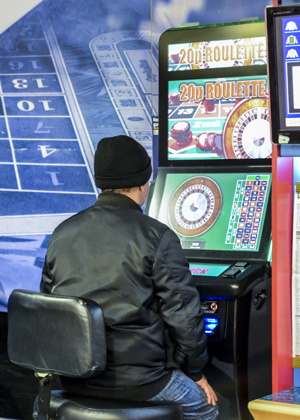The Future of High Street Bookmakers and Betting Shops In The UK
 From the moment someone went to a racecourse and placed a bet, the desire to have a flutter on any and all events that take place in the sporting realm has been hard for people to resist. The clamour to be allowed to do so legally, rather than using a dodgy backstreet bookie, grew so loud that the government eventually caved and the Betting and Gaming Act, introduced in 1960, gave the businesses permission to open on the high street from the first of May the following year. If people had assumed that it would garner little interest then they were soon proven wrong, with the new type of shop opening at a rate of one hundred a week and around ten thousand opening within the first six months. Even the Archbishop of Canterbury was behind the new law, believing that people’s gambling habits would be better off under the control of the government rather than illegal bookies.
From the moment someone went to a racecourse and placed a bet, the desire to have a flutter on any and all events that take place in the sporting realm has been hard for people to resist. The clamour to be allowed to do so legally, rather than using a dodgy backstreet bookie, grew so loud that the government eventually caved and the Betting and Gaming Act, introduced in 1960, gave the businesses permission to open on the high street from the first of May the following year. If people had assumed that it would garner little interest then they were soon proven wrong, with the new type of shop opening at a rate of one hundred a week and around ten thousand opening within the first six months. Even the Archbishop of Canterbury was behind the new law, believing that people’s gambling habits would be better off under the control of the government rather than illegal bookies.
It proved to bookmakers that there was an appetite for people to be able to place a bet or two in a sensible, controlled and legal manner. As a result, the number of shops where you could place a bet grew and grew with every passing year, reaching a peak of around sixteen thousand shops in the 1970s and into the 1980s. The shops weren’t always the most hospitable of places to go, with the government stating that they needed to essentially be grubby, windowless places in order to discourage society’s most vulnerable, such as women and children, from being tempted to enter them. The move onto the high street saw them become far more sleek and impressive establishments, ensuring that they didn’t stand out or bring down the look of the major shopping areas. Yet increased taxes and lower profitability saw shops starting to close at an alarming rate, so what does the future look like for the British bookmaker?
Changing Betting Habits, The Move To Online Betting

When the only way that you could place a bet legally involved heading into a shop on the high street, it stood to reason that they would be popular and profitable. Customers flocked to them in order to bet on football matches, horse racing, greyhound racing and more. The peak figure of sixteen thousand betting shops was testament to the fact that businesses were able to turn a profit irrespective of how much rent they had to pay precisely because they were so popular. Yet as time wore on the number of people using them began to wane, due in no small part to the rise of online betting. Why get up and go to your local bookies when you could turn on your computer and have a flutter on there? Even better, companies began to release apps that allowed you to bet on your phone without even needing to get out of bed.
By 2012 the number of shops had dropped to fewer than ten thousand, with that figure falling further in the three years that followed. It wasn’t just the convenience of betting online, either. The variety of bets that you could place on your phone was significantly more impressive than you would find in a bookmakers and the invention of In-Play betting took things even further. You could now place a bet on what was happening right in front of you in almost real time, meaning that on-street bookies could barely keep up. Little wonder, therefore, that the numbers carried on dropping. With fewer customers walking through the doors, bookmakers began to struggle to make money and they consequently started having to shut down. Certainly the independent shops struggled, seeing the likes of Warwick Bartlett selling his stores to Coral.
A few companies were able to maintain their grip on the industry, taking over the shops that were struggling. The problem was that these companies were relative behemoths, leading to several of them dominating the market. In the 1990s, around one and a half thousand bookmakers on the high street were independently owned, with that number falling to less than two hundred in recent years. If a firm owns numerous shops then they can use the profits from some to support those that are struggling, keeping them open for long enough to see if they can recover. If they only own one or two, however, then they’ll take the impact of the financial implications of increased costs. The likes of Betfred, Coral, Ladbrokes and William Hill soon began to dominate the market and few other companies had the ability to survive the onslaught. At the time of writing, the Association Of British Bookmakers believes that there are around nine thousand shops on the high street, accounting for about four percent of all retail units.
Other Reasons For The Decline Of Betting Shops
 It’s not just the preference for online gambling that’s resulting in shop closures, of course. Sometimes the shops have had to shut for positive reasons. When big companies merge together, the Competition and Markets Authority will have a look at how things seem to be lining up on the high street and may identify areas where shops are too strong and, as the name of the government organisation suggests, there isn’t much competition in the area. As a result the firms that are hoping to merge are forced to close certain shops in order to allow the merger to go ahead. Precisely that happened to Ladbrokes Coral when the two companies were hoping to join forces in 2016, with around four hundred shops needing to be sold in order to accommodate the joining together of the two gambling powerhouses.
It’s not just the preference for online gambling that’s resulting in shop closures, of course. Sometimes the shops have had to shut for positive reasons. When big companies merge together, the Competition and Markets Authority will have a look at how things seem to be lining up on the high street and may identify areas where shops are too strong and, as the name of the government organisation suggests, there isn’t much competition in the area. As a result the firms that are hoping to merge are forced to close certain shops in order to allow the merger to go ahead. Precisely that happened to Ladbrokes Coral when the two companies were hoping to join forces in 2016, with around four hundred shops needing to be sold in order to accommodate the joining together of the two gambling powerhouses.
It’s worth noting that it’s not just bookmakers that have been struggling to maintain their presence on the high street. Countless chains, including such well-known ones as Marks & Spencer’s, and Next, have had to close shops in recent times. The reason for the struggle is put down to a fall in disposable income, thanks to inflation rising and wages not doing so. That’s left people short of money that they’re able to spend on ‘fun’ things, which gambling falls into the category of. That, combined with credit card companies choosing to reduce the length of interest-free periods they offer and the fact that the country is due to leave the European Union in the coming years, meaning companies are unsure whether and where to invest, means that the high street is not as solid a bet as it once was.
The Future Of High Street Bookmakers
 The reality is that there will almost certainly be a place for bookmakers on the high street. As much as their presence has been diminishing in recent times, they haven’t disappeared altogether. It’s noteworthy, for example, that there are still more than half the number of bookies on the high street that there were at the industry’s height during the 1970s. Whilst plenty of people are happy to move online, not all customers are able or willing to do that. Don’t forget that most of the people who were placing bets in person throughout the 1980s and 1990s will still be alive and well now, but will perhaps be of the generation that doesn’t find it as naturally as the younger ones to use computers and mobile phones for things that involve finances.
The reality is that there will almost certainly be a place for bookmakers on the high street. As much as their presence has been diminishing in recent times, they haven’t disappeared altogether. It’s noteworthy, for example, that there are still more than half the number of bookies on the high street that there were at the industry’s height during the 1970s. Whilst plenty of people are happy to move online, not all customers are able or willing to do that. Don’t forget that most of the people who were placing bets in person throughout the 1980s and 1990s will still be alive and well now, but will perhaps be of the generation that doesn’t find it as naturally as the younger ones to use computers and mobile phones for things that involve finances.
That generation will eventually begin to die off might see bookmakers lose more and more of their customers is unquestionable, but in the mean time a whole new generation of punters are going into physical shops and getting used to the experience of placing a bet in person. That’s something that many find to be ritualistic, which isn’t the case in the same manner when it comes to placing bets online. There are many people outside of the older generation that don’t trust doing things online; a fact that hasn’t been helped in recent years with controversies surrounding how the likes of Facebook and Google use personal information. Don’t imagine, therefore, that just because bookies look as though they’re struggling at the moment that that means they will continue to do as we move into the future.
Cash is also a big factor and many people who like to bet in cash will only do so through a high street bookie. Now it is actually possible to fund an online account with cash through a betting shop by linking your online account. You will however always need to verify your age, identity and residential status if you bet online and may people do not want to do that, preferring the anonymity of betting with cash in a shop. In a shop your physical presence is your proof of age and residential status – of course for the same reasons high street betting shops are also still used as a means to launder money too.
Instead of lack of custom, the thing that is likely to stop bookmakers from operating on the high street is the bookmakers themselves. High street bookmakers bring in about 27% of all gambling money, which is close to the 28% brought in by the National Lottery. However, it’s nothing compared to the 40% of the entire industry that is made by online betting. To give you a sense how much that is, land-based casinos make around 5% of the money made by the gambling industry. There may well come a point, then, when betting companies have to decide whether it’s worth their while to continue operating on the high street when most of their profit is coming from online sources. A lot of that may depend on the market share earned by the more traditional bookmakers, such as William Hill and Ladbrokes. If they start to see high street shops as an inefficient money-making exercise then it likely won’t be long before they begin to cut their losses.
Fixed Odds Betting Terminals
 Perhaps the greatest threat to high street bookmakers at the present time are the countless restrictions that are being put on them by the government. One of the most obvious and influential examples of this is the reduction of stake imposed on Fixed Odds Betting Terminals. FOBTs, as they’re known, have been called the ‘crack cocaine of betting’, thanks to the fact that punters can place numerous bets in quick succession. The government restricted the number of terminals that shops could have to four, but that just encouraged bookmakers to open more shops in order to house more of the devices. The curb on them was asked for by campaigners because of research by the Gambling Commission that suggests there are more than two million problem gamblers in the UK.
Perhaps the greatest threat to high street bookmakers at the present time are the countless restrictions that are being put on them by the government. One of the most obvious and influential examples of this is the reduction of stake imposed on Fixed Odds Betting Terminals. FOBTs, as they’re known, have been called the ‘crack cocaine of betting’, thanks to the fact that punters can place numerous bets in quick succession. The government restricted the number of terminals that shops could have to four, but that just encouraged bookmakers to open more shops in order to house more of the devices. The curb on them was asked for by campaigners because of research by the Gambling Commission that suggests there are more than two million problem gamblers in the UK.
A government review has now been carried out, with the maximum stake now cut to £2 as October 1st 2019. The industry has consistently suggested that a cut as high as that would result in job losses and shop closures, such is the extent to which FOBTs are a huge money maker for them. The closing of shops is something that affects the industry as a whole, with every single shop paying horse racing in the UK £30,000 for the rights to show races live on the premises. Obviously that’s a large amount of money to disappear from the industry with each shop closure, which is money that they don’t get back from anywhere else. That’s especially the case when Fixed Odds Betting Terminals were curbed.
The future of high street bookmakers is far from decided, therefore. Closures don’t just affect the companies that own them, instead having an impact on other sections of the industry. It’s also worth noting that the high streets themselves suffer from betting shops closing down, with research suggesting that people spend money in local stores after placing bets in person. That’s to say nothing of the fact that the shops employ local people and pay into the local community. Problem gambling remains an issue that needs to be dealt with, but shop closure might not be the way to do it.



